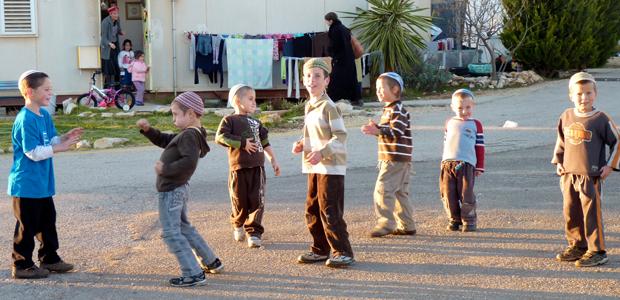Israeli Settlement Ordered Demolished
Israel’s Supreme Court has ruled that the Migron outpost sits on private Palestinian land and it must be demolished by the end of March 2012. (Photo: Noam Sharon)
A brief revival of negotiations between Israel and the Palestinians — this time hosted by the Kingdom of Jordan — has ended in failure. Both sides are blaming each other. Once again, one of the issues that proved to be a stumbling block was Jewish settlements in the West Bank.
But there is one settlement very much in the political spotlight right now. It’s called Migron.
About 50 Jewish Israeli families — 300 or so people in all — live at Migron. It’s mostly a cluster of mobile homes on a treeless hilltop outside the Palestinian city of Ramallah.
Migron is the largest of the so-called illegal outposts scattered throughout the West Bank. But in the case of Israeli settlements, illegal doesn’t necessarily mean unsanctioned. Migron spokesman Itai Chemo said there is bitter irony to the situation.
“There’s an electricity poll,” Chemo pointed out to me during a recent visit to Migron. “I cannot bring it on my own, it’s the country that put it over here, the state.”
People have lived at Migron for 10 years, Chemo added. “The houses that you see here were brought in by the ministry of housing. The ministry of defense built the roads and all the infrastructure.” As what about water, I asked? “Same thing,” Chemo said.
But thanks to a Supreme Court decision that came down in August last year, the future of Migron is uncertain. The judges ruled that Migron was built illegally on private Palestinian land. And they ordered the government to evict the residents and demolish their homes by the end of March.
Itai Chemo called the demolition order, “the most horrific thing that a country can do to its people.”
But there is another group of people just down the hill from Migron who not happy with the situation either. They are the residents of the Palestinian village of Burka.
Standing next to an old cemetery filled with stones bearing inscriptions in Arabic, a village native who did not want to give his name said, “Do they have a cemetery over there? We belong. This is our proof that this land is ours.”
The Palestinian man said Migron should never have been built. He said the settlers living there now should be evicted according to Israel’s own rule of law.
“What gives them the right to take the land? ‘God gave us this, God said in the Bible that this is our land.’ What about us?”
“It’s apartheid,” he said. That’s all it is. We’re looked upon as nothing, we don’t belong here, we’re a nuisance.”
Palestinians seriously doubt Migron will ever be evacuated. That is despite the fact that Israel’s Defense Minister, Ehud Barak has said “it’s out of the question” for settlers to remain on private Palestinian land.
There is also a precedent for demolishing illegal buildings at Migron. It happened last September. Settlers tussled with Israeli police as bulldozers knocked down two houses. It was the kind of scene that pro-settler politicians say cannot be repeated, regardless of the Supreme Court decision.
Vice premier Silvan Shalom recently paid a visit to Migron and weighed in on the issue.
“We need to find a noble compromise,” Shalom said.
What does that mean? It appears the Israeli government is going to build the residents of Migron new homes. The new houses will be put up on another West Bank hilltop, about a mile from where they live right now. It is not clear how long this would take, or what would happen to the existing buildings at Migron itself.
But Peace Now, an Israeli organization that opposes the settlements, says the deal would essentially reward settlers for breaking the law.
“The deals that they are trying to make are absurd,” said Etai Mizrav of Peace Now. “We already passed the debating part and we’re now in the part when, after so many years that this injustice is taking place, the Supreme Court said that Migron should not be where it is right now.”
The prime minister’s spokesman, Mark Regev said he agrees with that. The law is clear and the Supreme Court has spoken, he said. Migron has to be evacuated by the end of March.
But Regev also said that finding a compromise with the settlers there is about avoiding violence.
“We are seeking a negotiated solution involving a voluntary relocation,” Regev said. “But if that’s not possible. I have to be clear: the Supreme Court’s decisions will be implemented.”
That would still leave about 100 illegal West Bank outposts in legal limbo. But the Israeli government is moving to resolve the legal question of the outposts. It has just put together a committee of legal experts to look at ways of legalizing the illegal outposts once and for all.
